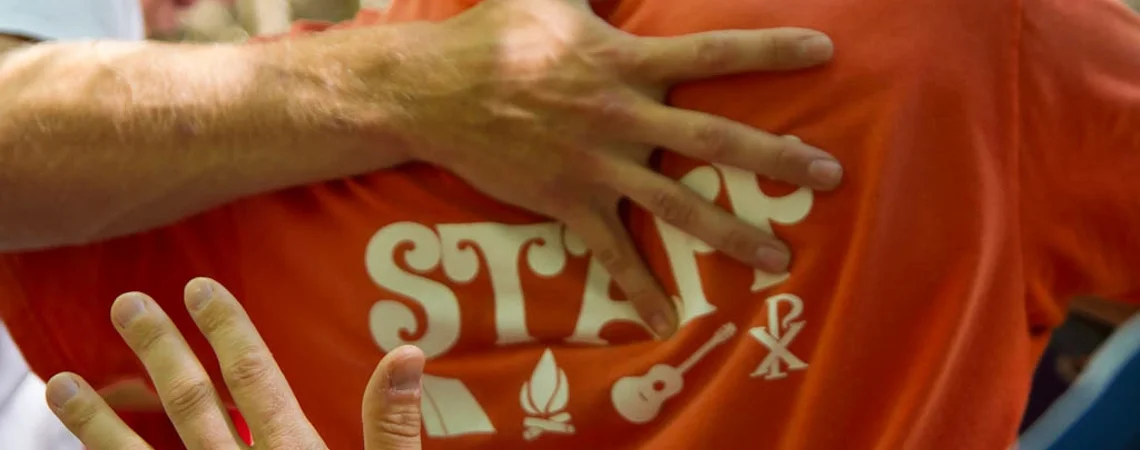We are excited to partner with Curt “Moose” Jackson from Summer Camp Program Director on a new project just in time for your summer camp staff training preparations.
Summer Camp Staff Training E-Mail Roundtable and Contest
(The last day to submit ideas is Wednesday, May 9)
We invite all readers of this blog to send us in your best ever staff training sessions. We’re looking for ideas of training sessions that rocked the socks off of your staff.
Think of the sessions where everyone left happy and energized and excited. Those times when you knew that they understood exactly what you needed them to, and they still had a great time. Send us those!
People who participate in this roundtable (ideas must be submitted to: camp.roundtable@gmail.com) will receive a copy of the PDF booklet of all all of our collected ideas.
Please note: You need to be signed up for the CampHacker and Summer Camp Program Director newsletters to participate. Please click on the link above to sign up for our newsletter and go to Moose’s website to sign up for his.
Details from Curt’s amazing summer camp resource: Summer Camp Program Director
What is your best staff training idea?
We have all been a part of staff trainings and many of us have led staff trainings. What principles, techniques or ah-ha moments have you done or observed that was amazing? Or perhaps you have created a new idea for this summer’s staff training. Maybe you need a reminder on topics to spur your memory or imagination. So, here is a list of staff training areas. Of course, there are more, but this should help you out if you are struggling with this roundtable. Please keep in mind that you can submit more than one idea.
- Supervising Staff
- Camper Behavior and Discipline
- Working With Varying Age Groups
- Camp Counselor Tips, Tricks and Best Practices
- Emergency Procedures
- Anti-Bullying
- Communications
- Policies and Procedures
- Staff Icebreakers
- Conflict Resolution
- Field Trip Procedures
- Teachable Moments with Campers
- Working with Co-Workers
- Debriefing Techniques
- Working with Children with Disabilities (Physical, Learning, etc.)
- Dealing with Homesickness
The Prizes
Everyone who participates will receive the final compilation which will also include a few favorite staff training ideas from some experts that have agreed to contribute as well.
Our judges include:
- Curt “Moose” Jackson (that’s me!)
- Travis Allison of CampHacker.org
- Scott Arizala of TheCampCounselor.com
- Chris Pallatto of UltimateCampResource.com
1st Place will receive:
- One year of Premium Access advertising package ($1080 value) provided by CampEasy.com
- Online Marketing EVO (Evaluating Your Vision Online) Consultation ($500 value) provided by Travis Allison of CampHacker.org
- 1 Icebreaker Thumball and 1 Move Your Body Thumball provided by Michelle Cummings of Training Wheels
- 5 Hip Pocket Activity booklets provided by Curt “Moose” Jackson of Recreation Pros
- 5 Play Pens provided by Chris Pallatto of Ultimate Camp Resource
2nd Place will receive:
- $50 Amazon Gift Card provided by Travis Allison of CampHacker.org
- 5 Hip Pocket Activity booklets provided by Curt “Moose” Jackson of Recreation Pros
- 5 Play Pens provided by Chris Pallatto of Ultimate Camp Resource
- 1 Pocket Processor Deck provided by Michelle Cummings of Training Wheels
2 Honorable Mentions will receive:
- 5 Hip Pocket Activity booklets provided by Curt “Moose” Jackson of Recreation Pros
- 5 Play Pens provided by Chris Pallatto of Ultimate Camp Resource
- 1 Pocket Processor Deck provided by Michelle Cummings of Training Wheels
If you have any questions or comments please email me.





